A Comprehensive Report on Generation X in the Modern Workplace
VerifiedAdded on 2020/05/11
|7
|1652
|67
Report
AI Summary
This report provides an in-depth analysis of Generation X employees in the workplace, focusing on their unique characteristics, communication styles, and expectations regarding work-life balance. It examines how Generation X, born between 1961 and 1976, differs from Baby Boomers and Millennials, particularly in terms of their independence, desire for autonomy, and approach to communication. The report highlights their preference for work-life balance and their willingness to seek opportunities that offer it. It also provides recommendations for managing Generation X employees effectively, emphasizing the importance of fostering an environment that values their input, provides opportunities for growth, and respects their need for independence. The report emphasizes that Generation X employees are dedicated to their work but may not be committed to the company, as they seek opportunities to grow and explore. The report highlights the use of email and formal communication. The report concludes by emphasizing that Generation X employees bridge the gap between Baby Boomers and Millennials.
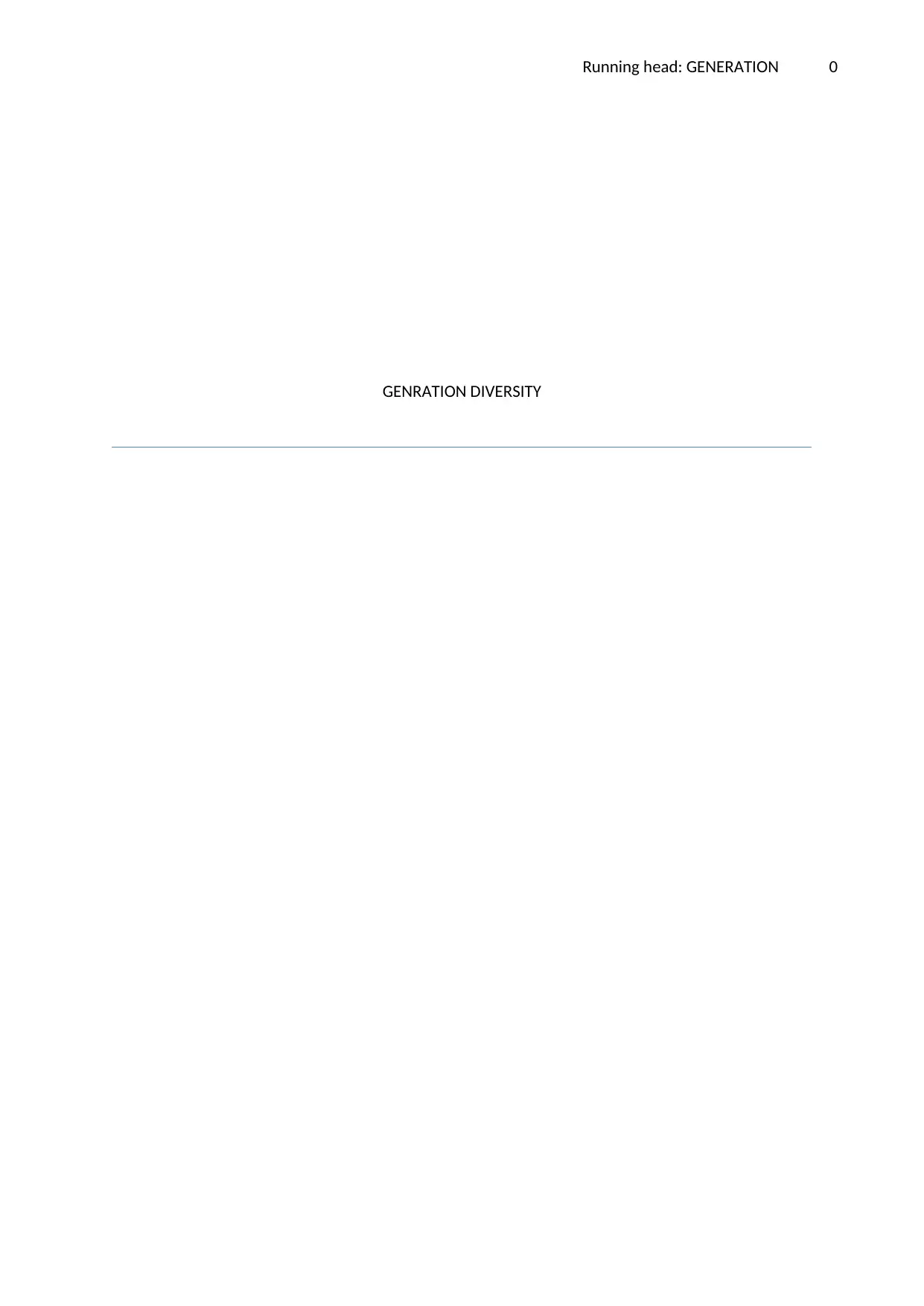
Running head: GENERATION 0
GENRATION DIVERSITY
GENRATION DIVERSITY
Paraphrase This Document
Need a fresh take? Get an instant paraphrase of this document with our AI Paraphraser
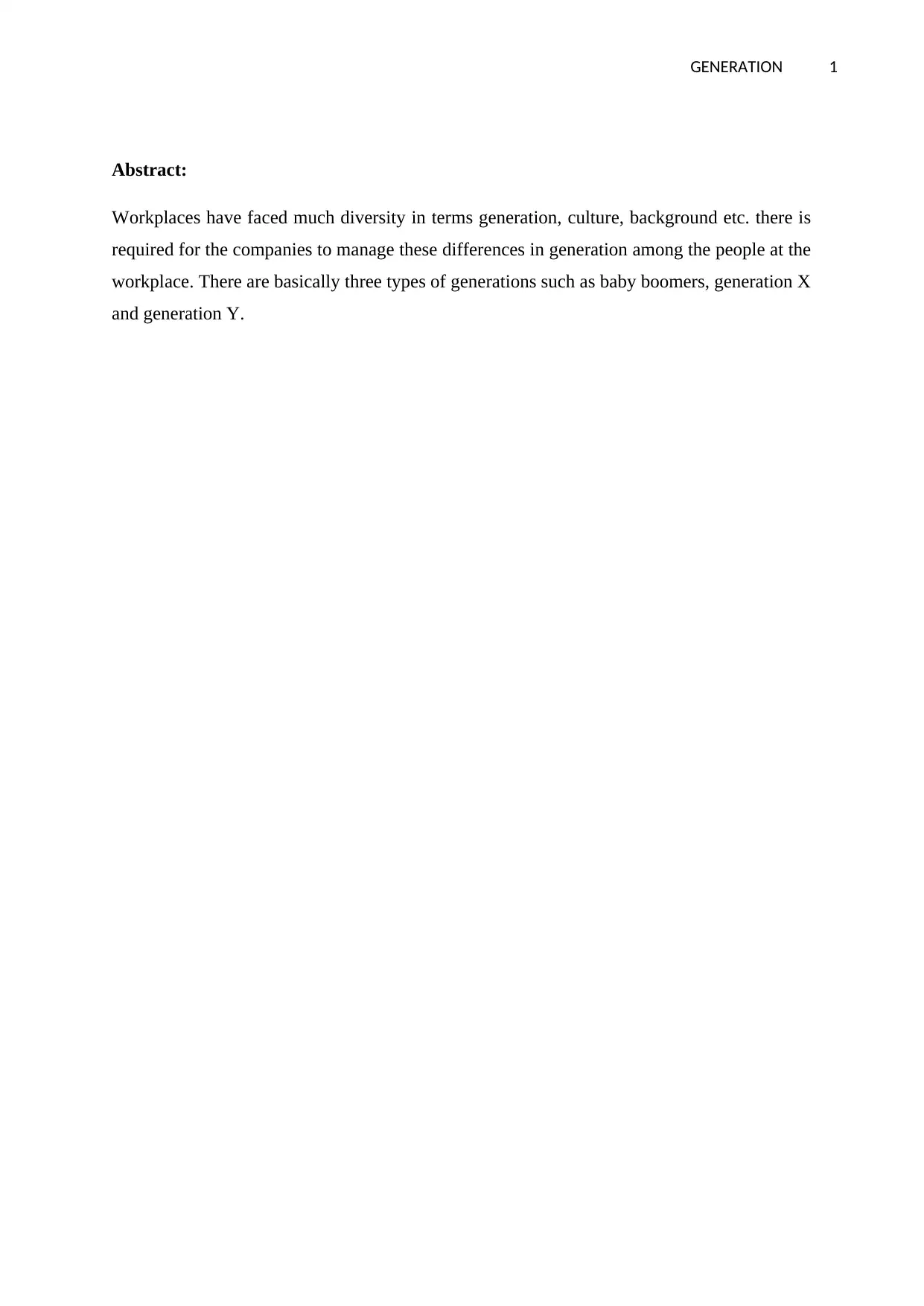
GENERATION 1
Abstract:
Workplaces have faced much diversity in terms generation, culture, background etc. there is
required for the companies to manage these differences in generation among the people at the
workplace. There are basically three types of generations such as baby boomers, generation X
and generation Y.
Abstract:
Workplaces have faced much diversity in terms generation, culture, background etc. there is
required for the companies to manage these differences in generation among the people at the
workplace. There are basically three types of generations such as baby boomers, generation X
and generation Y.
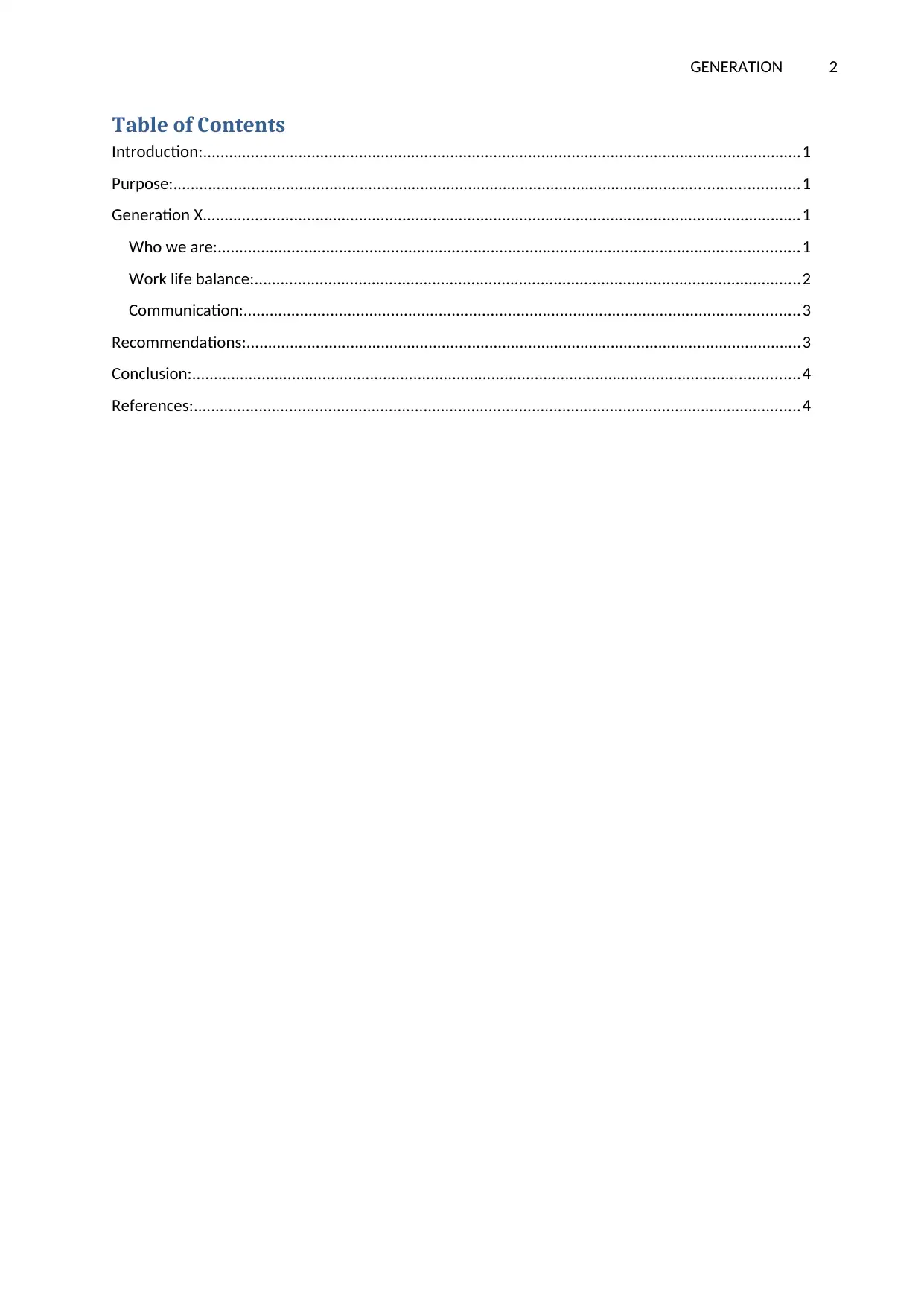
GENERATION 2
Table of Contents
Introduction:..........................................................................................................................................1
Purpose:................................................................................................................................................1
Generation X..........................................................................................................................................1
Who we are:......................................................................................................................................1
Work life balance:..............................................................................................................................2
Communication:................................................................................................................................3
Recommendations:................................................................................................................................3
Conclusion:............................................................................................................................................4
References:............................................................................................................................................4
Table of Contents
Introduction:..........................................................................................................................................1
Purpose:................................................................................................................................................1
Generation X..........................................................................................................................................1
Who we are:......................................................................................................................................1
Work life balance:..............................................................................................................................2
Communication:................................................................................................................................3
Recommendations:................................................................................................................................3
Conclusion:............................................................................................................................................4
References:............................................................................................................................................4
⊘ This is a preview!⊘
Do you want full access?
Subscribe today to unlock all pages.

Trusted by 1+ million students worldwide
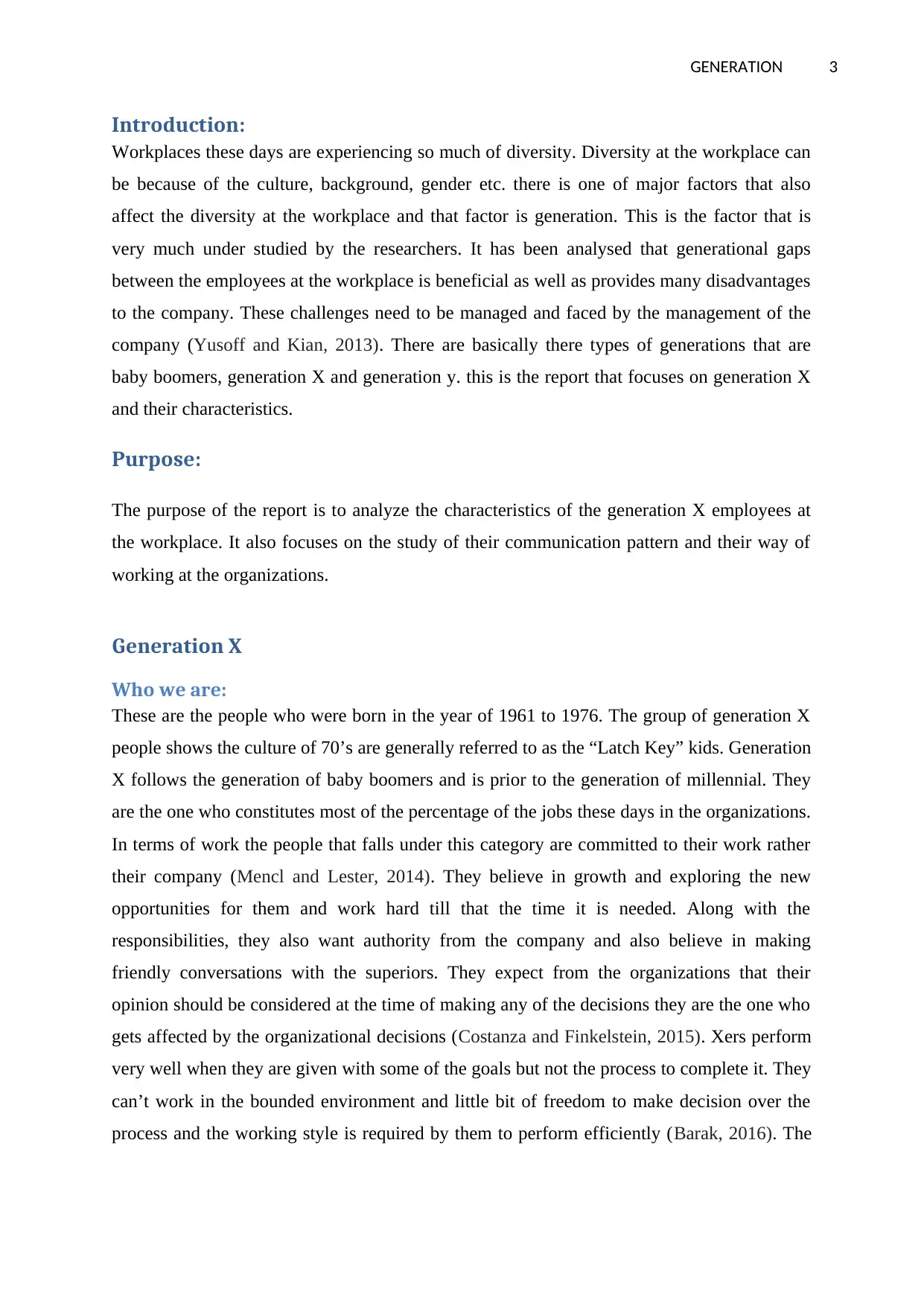
GENERATION 3
Introduction:
Workplaces these days are experiencing so much of diversity. Diversity at the workplace can
be because of the culture, background, gender etc. there is one of major factors that also
affect the diversity at the workplace and that factor is generation. This is the factor that is
very much under studied by the researchers. It has been analysed that generational gaps
between the employees at the workplace is beneficial as well as provides many disadvantages
to the company. These challenges need to be managed and faced by the management of the
company (Yusoff and Kian, 2013). There are basically there types of generations that are
baby boomers, generation X and generation y. this is the report that focuses on generation X
and their characteristics.
Purpose:
The purpose of the report is to analyze the characteristics of the generation X employees at
the workplace. It also focuses on the study of their communication pattern and their way of
working at the organizations.
Generation X
Who we are:
These are the people who were born in the year of 1961 to 1976. The group of generation X
people shows the culture of 70’s are generally referred to as the “Latch Key” kids. Generation
X follows the generation of baby boomers and is prior to the generation of millennial. They
are the one who constitutes most of the percentage of the jobs these days in the organizations.
In terms of work the people that falls under this category are committed to their work rather
their company (Mencl and Lester, 2014). They believe in growth and exploring the new
opportunities for them and work hard till that the time it is needed. Along with the
responsibilities, they also want authority from the company and also believe in making
friendly conversations with the superiors. They expect from the organizations that their
opinion should be considered at the time of making any of the decisions they are the one who
gets affected by the organizational decisions (Costanza and Finkelstein, 2015). Xers perform
very well when they are given with some of the goals but not the process to complete it. They
can’t work in the bounded environment and little bit of freedom to make decision over the
process and the working style is required by them to perform efficiently (Barak, 2016). The
Introduction:
Workplaces these days are experiencing so much of diversity. Diversity at the workplace can
be because of the culture, background, gender etc. there is one of major factors that also
affect the diversity at the workplace and that factor is generation. This is the factor that is
very much under studied by the researchers. It has been analysed that generational gaps
between the employees at the workplace is beneficial as well as provides many disadvantages
to the company. These challenges need to be managed and faced by the management of the
company (Yusoff and Kian, 2013). There are basically there types of generations that are
baby boomers, generation X and generation y. this is the report that focuses on generation X
and their characteristics.
Purpose:
The purpose of the report is to analyze the characteristics of the generation X employees at
the workplace. It also focuses on the study of their communication pattern and their way of
working at the organizations.
Generation X
Who we are:
These are the people who were born in the year of 1961 to 1976. The group of generation X
people shows the culture of 70’s are generally referred to as the “Latch Key” kids. Generation
X follows the generation of baby boomers and is prior to the generation of millennial. They
are the one who constitutes most of the percentage of the jobs these days in the organizations.
In terms of work the people that falls under this category are committed to their work rather
their company (Mencl and Lester, 2014). They believe in growth and exploring the new
opportunities for them and work hard till that the time it is needed. Along with the
responsibilities, they also want authority from the company and also believe in making
friendly conversations with the superiors. They expect from the organizations that their
opinion should be considered at the time of making any of the decisions they are the one who
gets affected by the organizational decisions (Costanza and Finkelstein, 2015). Xers perform
very well when they are given with some of the goals but not the process to complete it. They
can’t work in the bounded environment and little bit of freedom to make decision over the
process and the working style is required by them to perform efficiently (Barak, 2016). The
Paraphrase This Document
Need a fresh take? Get an instant paraphrase of this document with our AI Paraphraser
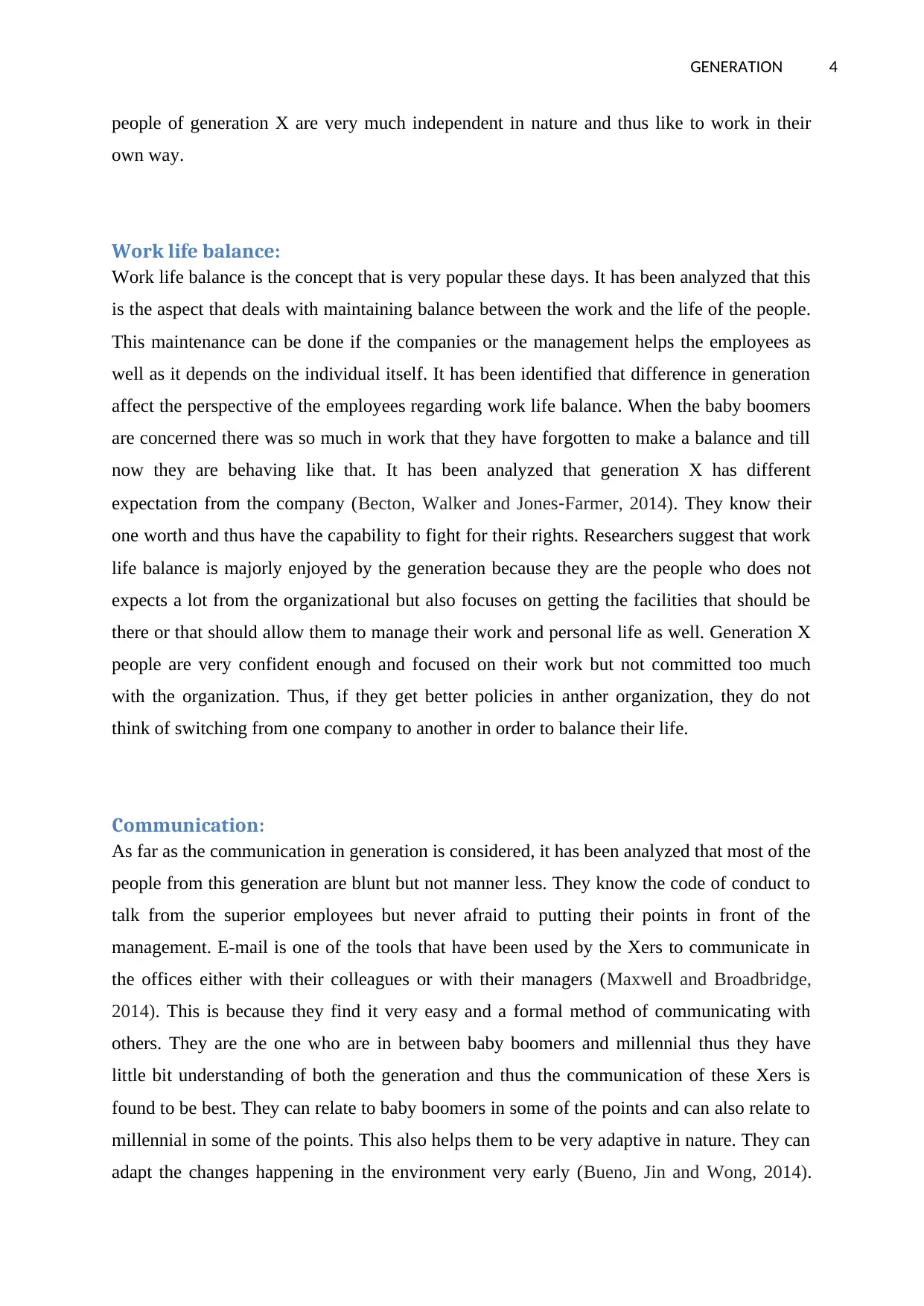
GENERATION 4
people of generation X are very much independent in nature and thus like to work in their
own way.
Work life balance:
Work life balance is the concept that is very popular these days. It has been analyzed that this
is the aspect that deals with maintaining balance between the work and the life of the people.
This maintenance can be done if the companies or the management helps the employees as
well as it depends on the individual itself. It has been identified that difference in generation
affect the perspective of the employees regarding work life balance. When the baby boomers
are concerned there was so much in work that they have forgotten to make a balance and till
now they are behaving like that. It has been analyzed that generation X has different
expectation from the company (Becton, Walker and Jones‐Farmer, 2014). They know their
one worth and thus have the capability to fight for their rights. Researchers suggest that work
life balance is majorly enjoyed by the generation because they are the people who does not
expects a lot from the organizational but also focuses on getting the facilities that should be
there or that should allow them to manage their work and personal life as well. Generation X
people are very confident enough and focused on their work but not committed too much
with the organization. Thus, if they get better policies in anther organization, they do not
think of switching from one company to another in order to balance their life.
Communication:
As far as the communication in generation is considered, it has been analyzed that most of the
people from this generation are blunt but not manner less. They know the code of conduct to
talk from the superior employees but never afraid to putting their points in front of the
management. E-mail is one of the tools that have been used by the Xers to communicate in
the offices either with their colleagues or with their managers (Maxwell and Broadbridge,
2014). This is because they find it very easy and a formal method of communicating with
others. They are the one who are in between baby boomers and millennial thus they have
little bit understanding of both the generation and thus the communication of these Xers is
found to be best. They can relate to baby boomers in some of the points and can also relate to
millennial in some of the points. This also helps them to be very adaptive in nature. They can
adapt the changes happening in the environment very early (Bueno, Jin and Wong, 2014).
people of generation X are very much independent in nature and thus like to work in their
own way.
Work life balance:
Work life balance is the concept that is very popular these days. It has been analyzed that this
is the aspect that deals with maintaining balance between the work and the life of the people.
This maintenance can be done if the companies or the management helps the employees as
well as it depends on the individual itself. It has been identified that difference in generation
affect the perspective of the employees regarding work life balance. When the baby boomers
are concerned there was so much in work that they have forgotten to make a balance and till
now they are behaving like that. It has been analyzed that generation X has different
expectation from the company (Becton, Walker and Jones‐Farmer, 2014). They know their
one worth and thus have the capability to fight for their rights. Researchers suggest that work
life balance is majorly enjoyed by the generation because they are the people who does not
expects a lot from the organizational but also focuses on getting the facilities that should be
there or that should allow them to manage their work and personal life as well. Generation X
people are very confident enough and focused on their work but not committed too much
with the organization. Thus, if they get better policies in anther organization, they do not
think of switching from one company to another in order to balance their life.
Communication:
As far as the communication in generation is considered, it has been analyzed that most of the
people from this generation are blunt but not manner less. They know the code of conduct to
talk from the superior employees but never afraid to putting their points in front of the
management. E-mail is one of the tools that have been used by the Xers to communicate in
the offices either with their colleagues or with their managers (Maxwell and Broadbridge,
2014). This is because they find it very easy and a formal method of communicating with
others. They are the one who are in between baby boomers and millennial thus they have
little bit understanding of both the generation and thus the communication of these Xers is
found to be best. They can relate to baby boomers in some of the points and can also relate to
millennial in some of the points. This also helps them to be very adaptive in nature. They can
adapt the changes happening in the environment very early (Bueno, Jin and Wong, 2014).
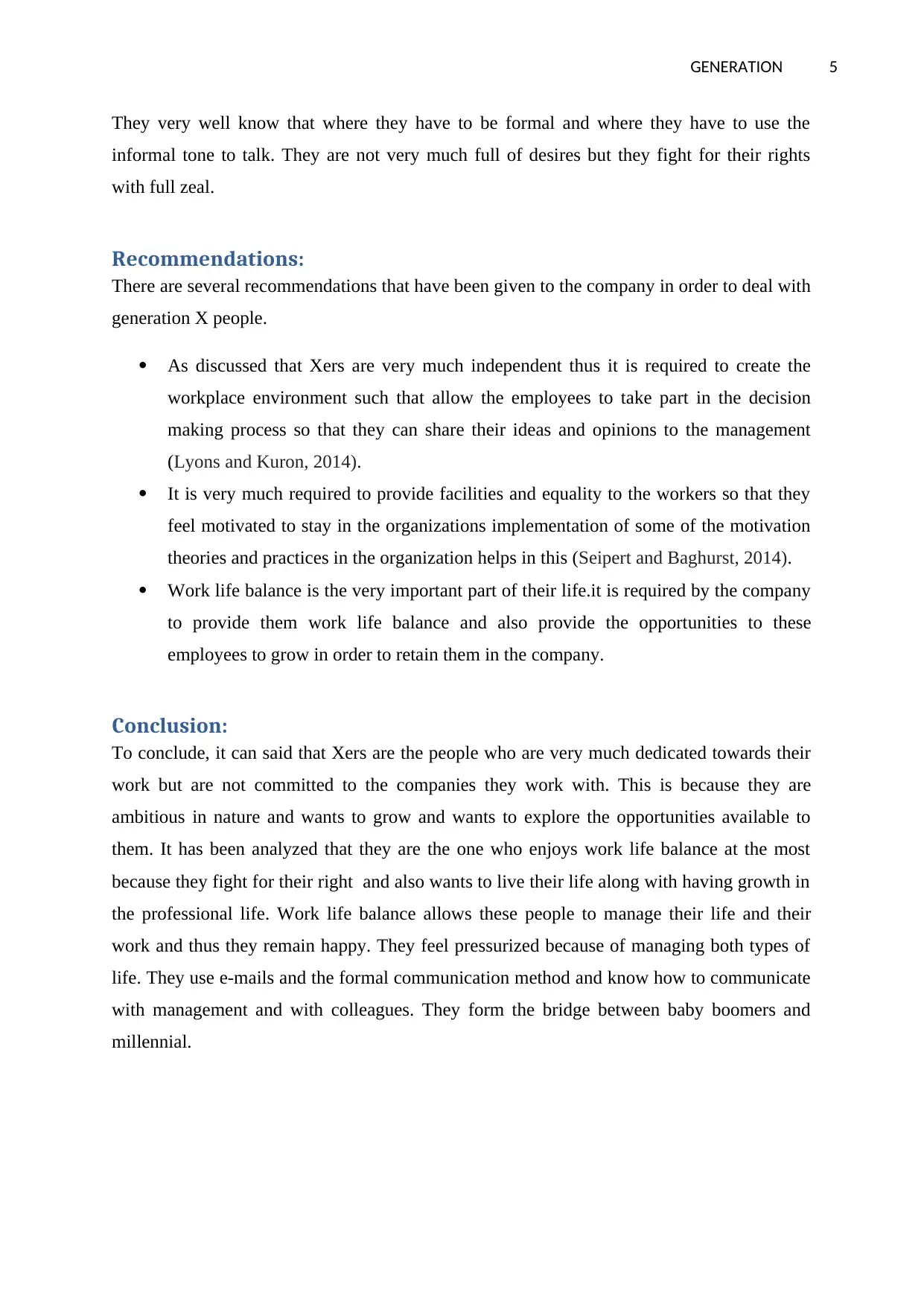
GENERATION 5
They very well know that where they have to be formal and where they have to use the
informal tone to talk. They are not very much full of desires but they fight for their rights
with full zeal.
Recommendations:
There are several recommendations that have been given to the company in order to deal with
generation X people.
As discussed that Xers are very much independent thus it is required to create the
workplace environment such that allow the employees to take part in the decision
making process so that they can share their ideas and opinions to the management
(Lyons and Kuron, 2014).
It is very much required to provide facilities and equality to the workers so that they
feel motivated to stay in the organizations implementation of some of the motivation
theories and practices in the organization helps in this (Seipert and Baghurst, 2014).
Work life balance is the very important part of their life.it is required by the company
to provide them work life balance and also provide the opportunities to these
employees to grow in order to retain them in the company.
Conclusion:
To conclude, it can said that Xers are the people who are very much dedicated towards their
work but are not committed to the companies they work with. This is because they are
ambitious in nature and wants to grow and wants to explore the opportunities available to
them. It has been analyzed that they are the one who enjoys work life balance at the most
because they fight for their right and also wants to live their life along with having growth in
the professional life. Work life balance allows these people to manage their life and their
work and thus they remain happy. They feel pressurized because of managing both types of
life. They use e-mails and the formal communication method and know how to communicate
with management and with colleagues. They form the bridge between baby boomers and
millennial.
They very well know that where they have to be formal and where they have to use the
informal tone to talk. They are not very much full of desires but they fight for their rights
with full zeal.
Recommendations:
There are several recommendations that have been given to the company in order to deal with
generation X people.
As discussed that Xers are very much independent thus it is required to create the
workplace environment such that allow the employees to take part in the decision
making process so that they can share their ideas and opinions to the management
(Lyons and Kuron, 2014).
It is very much required to provide facilities and equality to the workers so that they
feel motivated to stay in the organizations implementation of some of the motivation
theories and practices in the organization helps in this (Seipert and Baghurst, 2014).
Work life balance is the very important part of their life.it is required by the company
to provide them work life balance and also provide the opportunities to these
employees to grow in order to retain them in the company.
Conclusion:
To conclude, it can said that Xers are the people who are very much dedicated towards their
work but are not committed to the companies they work with. This is because they are
ambitious in nature and wants to grow and wants to explore the opportunities available to
them. It has been analyzed that they are the one who enjoys work life balance at the most
because they fight for their right and also wants to live their life along with having growth in
the professional life. Work life balance allows these people to manage their life and their
work and thus they remain happy. They feel pressurized because of managing both types of
life. They use e-mails and the formal communication method and know how to communicate
with management and with colleagues. They form the bridge between baby boomers and
millennial.
⊘ This is a preview!⊘
Do you want full access?
Subscribe today to unlock all pages.

Trusted by 1+ million students worldwide
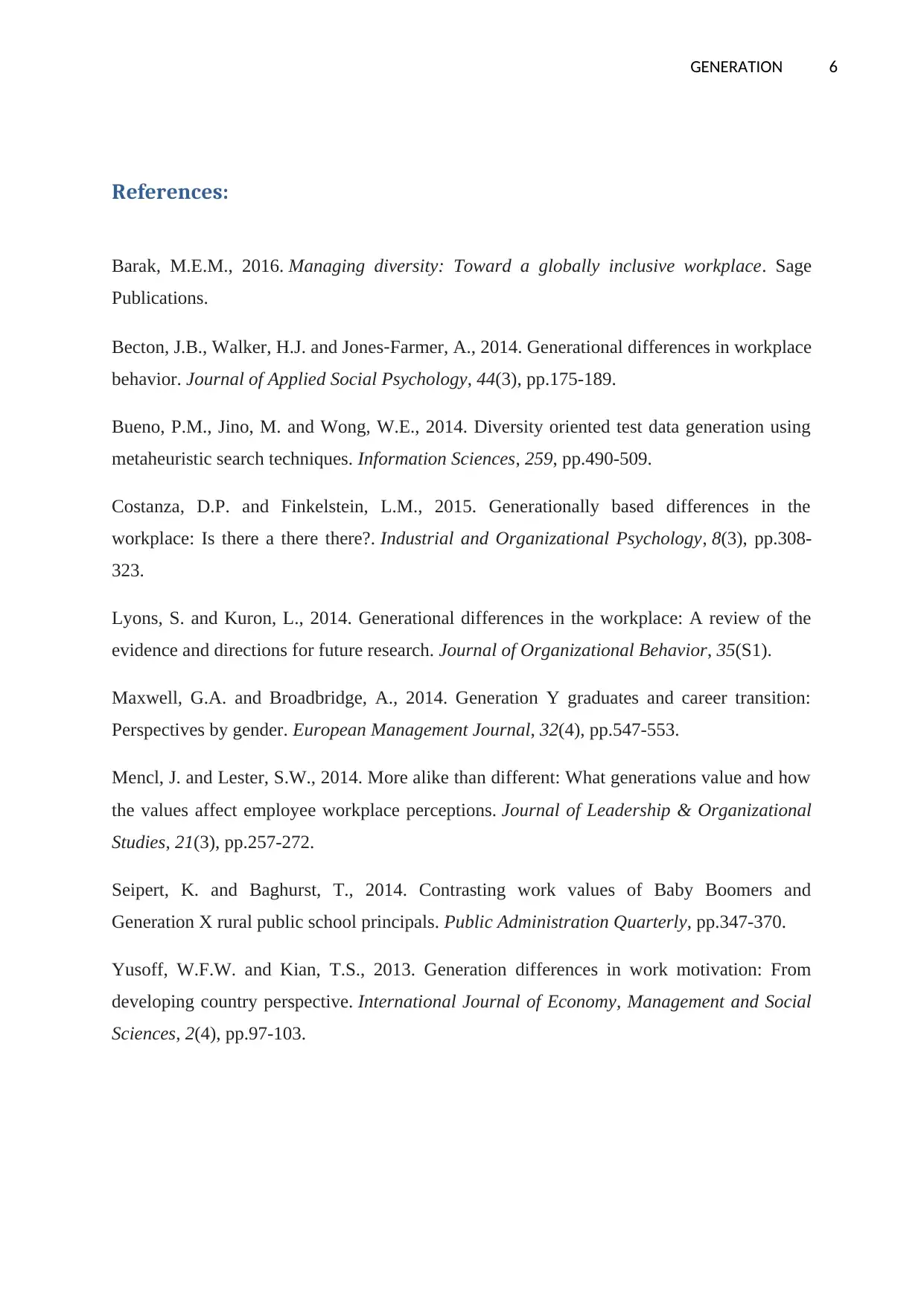
GENERATION 6
References:
Barak, M.E.M., 2016. Managing diversity: Toward a globally inclusive workplace. Sage
Publications.
Becton, J.B., Walker, H.J. and Jones‐Farmer, A., 2014. Generational differences in workplace
behavior. Journal of Applied Social Psychology, 44(3), pp.175-189.
Bueno, P.M., Jino, M. and Wong, W.E., 2014. Diversity oriented test data generation using
metaheuristic search techniques. Information Sciences, 259, pp.490-509.
Costanza, D.P. and Finkelstein, L.M., 2015. Generationally based differences in the
workplace: Is there a there there?. Industrial and Organizational Psychology, 8(3), pp.308-
323.
Lyons, S. and Kuron, L., 2014. Generational differences in the workplace: A review of the
evidence and directions for future research. Journal of Organizational Behavior, 35(S1).
Maxwell, G.A. and Broadbridge, A., 2014. Generation Y graduates and career transition:
Perspectives by gender. European Management Journal, 32(4), pp.547-553.
Mencl, J. and Lester, S.W., 2014. More alike than different: What generations value and how
the values affect employee workplace perceptions. Journal of Leadership & Organizational
Studies, 21(3), pp.257-272.
Seipert, K. and Baghurst, T., 2014. Contrasting work values of Baby Boomers and
Generation X rural public school principals. Public Administration Quarterly, pp.347-370.
Yusoff, W.F.W. and Kian, T.S., 2013. Generation differences in work motivation: From
developing country perspective. International Journal of Economy, Management and Social
Sciences, 2(4), pp.97-103.
References:
Barak, M.E.M., 2016. Managing diversity: Toward a globally inclusive workplace. Sage
Publications.
Becton, J.B., Walker, H.J. and Jones‐Farmer, A., 2014. Generational differences in workplace
behavior. Journal of Applied Social Psychology, 44(3), pp.175-189.
Bueno, P.M., Jino, M. and Wong, W.E., 2014. Diversity oriented test data generation using
metaheuristic search techniques. Information Sciences, 259, pp.490-509.
Costanza, D.P. and Finkelstein, L.M., 2015. Generationally based differences in the
workplace: Is there a there there?. Industrial and Organizational Psychology, 8(3), pp.308-
323.
Lyons, S. and Kuron, L., 2014. Generational differences in the workplace: A review of the
evidence and directions for future research. Journal of Organizational Behavior, 35(S1).
Maxwell, G.A. and Broadbridge, A., 2014. Generation Y graduates and career transition:
Perspectives by gender. European Management Journal, 32(4), pp.547-553.
Mencl, J. and Lester, S.W., 2014. More alike than different: What generations value and how
the values affect employee workplace perceptions. Journal of Leadership & Organizational
Studies, 21(3), pp.257-272.
Seipert, K. and Baghurst, T., 2014. Contrasting work values of Baby Boomers and
Generation X rural public school principals. Public Administration Quarterly, pp.347-370.
Yusoff, W.F.W. and Kian, T.S., 2013. Generation differences in work motivation: From
developing country perspective. International Journal of Economy, Management and Social
Sciences, 2(4), pp.97-103.
1 out of 7
Related Documents
Your All-in-One AI-Powered Toolkit for Academic Success.
+13062052269
info@desklib.com
Available 24*7 on WhatsApp / Email
![[object Object]](/_next/static/media/star-bottom.7253800d.svg)
Unlock your academic potential
Copyright © 2020–2026 A2Z Services. All Rights Reserved. Developed and managed by ZUCOL.





